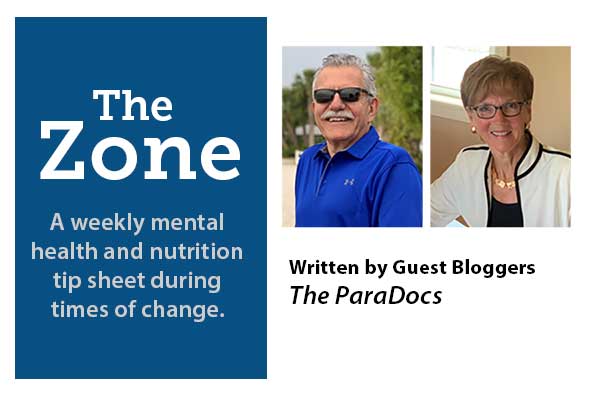Major life transitions are uncomfortable. They don’t come easy. And while our impulse may be to avoid our discomfort altogether, that avoidance will keep us stuck.
In Volume 13 of this guest series, Psychotherapist, Dr. Francis L. Battisti and Nutritionist, Dr. Helen Battisti help us channel belief in ourselves in the face of major change.
For over 10 years, they have worked closely with us on aging concerns and have presented many webinars and in-person workshops. Their newsletter, The Zone, is a weekly mental health and nutrition tip sheet during times of change.
One of the aspects that accompanies major transitions in life is discomfort. While it may be easier to avoid discomfort, that only gives us a sense of being stuck and trapped. For example, moving into a new community, be it a neighborhood, a college campus, a church, or a new country, can bring about discomfort. “What if no one likes me?”, “What if I am the only one like me in the new community?”, “What if I never meet anyone new?” We need to keep in mind that we do have choices in how we handle our discomfort.
We can focus our energies on the discomfort and retreat to the four walls of our home. Or we can switch our focus to the opportunities that lie ahead of us in meeting the many elements of a new community. The first choice does not offer the possibility of the increase of self-efficacy that is needed to overcome future life’s obstacles. The second choice addresses the discomfort directly and builds an internal sense of resilience that can assist us for the rest of our life in dealing with difficult situations. How we choose to handle our discomfort today impacts how we experience future life changes/transitions.
Key Takeaways
- A natural element of changes/transitions is discomfort.
- Focusing our attention on the positive outcomes of our actions helps us further build our sense of self-efficacy.
- A resilient mindset offers a strong platform to address future changes/transitions.
Best Practices
- Choose role-models that exhibit the behaviors that we need to learn and observe their approach.
- Maintaining a balanced diet, www.choosemyplate.org, to help minimize the physical discomfort of negative emotions.
- Find an individual from history who models resilience and self-efficacy and read about them.
Things to Limit
- Masking your discomfort by not addressing it.
- Withdrawing from your surroundings.
- Delaying action until the “right time.”
In conclusion, living with discomfort is a natural result of changes/transitions. Addressing it is a component of developing a resilient mindset. Resilient living results in growing from adversity.
Quote of the Week
“Our finest moments most often occur when we are feeling deeply uncomfortable, unhappy, or unfulfilled. It is only in such moments, propelled by discomfort, that we are likely to step out of our ruts and start searching for different ways of truer answers.”
– M. Scott Peck

